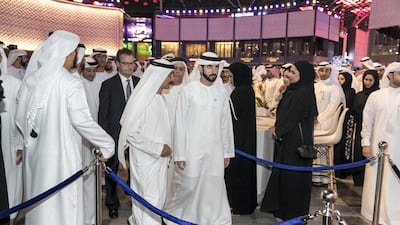Dubai commuters have been given the first glimpse of a new transportation system that will, it's claimed, whisk them to Abu Dhabi in less than 15 minutes.
As part of UAE Innovation Week, the Roads and Transportation Authority is displaying a full-scale model of the Hyperloop pod that is designed to reach speeds of well over 1,000 kilometres an hour.
Propelled in a vacuum tube with magnets, the new route is proposed by Richard Branson’s Virgin Hyperloop One company, which has also announced a similar project in India between Mumbai and Pune.
In 2016, Virgin Hyperloop secured US$50 million in initial funding from Dubai-based DP World and Caspian Venture Capital. It envisages having a prototype running by 2020.
Richard Branson, whose business interests include Virgin Airways and the Virgin Galactic SpaceShip One, joined Hyperloop One as chairman in December.
This week also saw the CEO of Virgin Hyperloop, Rob Lloyd, talking up the chances of the project’s success.
Mr Lloyd said that it is planned that the Dubai-Abu Dhabi line would be just one route in a wider GCC network.
"A hyperloop network that runs from Jeddah to Riyadh, to Abu Dhabi to Dubai as a backbone from the Red Sea to the Arabian sea is an amazing opportunity and would transform the potential movement of goods and the mobility of people and have a dramatic impact on the economic development and continued growth in the region," Mr Lloyd said in an exclusive interview with The National.
His company has spent a year working with the RTA to examine costs, ticket prices, likely passenger loads and the best routes. Discussions had been “very productive” he said.
The high-speed pods would run overground for most of the route, Mr Lloyd said, and then in tunnels to reach both city centres.
“Our strategy in the Emirates and with the RTA is to compliment the tremendous investments that are being made in infrastructure,” Mr Lloyd told Bloomberg earlier on Thursday.
He was less specific about the eventual cost of the 150km transport link. The Hyperloop concept was originally developed by billionaire Elon Musk who proposed a route between Los Angeles and San Francisco, which he believed could be built for $11m per mile.
Based on a company presentation, Forbes reported in October 2016 that the Dubai to Abu Dhabi route would cost $4.8 billion, or $52m a mile.
Estimating the eventual cost is difficult because the Hyperloop is a new and untested technology. Virgin Hyperloop has built a short test track in Nevada, sending unmanned pods so far up to 386kph, although still slower than the fastest high-speed trains.
_______________
Read more:
Study into feasibility of building Hyperloop between Abu Dhabi and Al Ain begins
Special report: Life in the fast lane
Hyperloop may be more trouble than it's worth
_______________
Major construction projects are also notorious for running over budget. The Channel Tunnel, which runs between Britain and France, ran $12bn, or 80 per cent, over budget, while the Big Dig underground road network in Boston exceeded planned costs by $13bn, or 220 per cent.
Virgin Hyperloop says it envisages financing for its projects to come from partnerships between governments and the private sector.
“I’m not worried about investors; I’m not worried about funding this company. I’m actually excited by the growing momentum,” Mr Lloyd said.
“We have governments around the world approaching us today interested in the huge economic impact that this technology delivers.”









